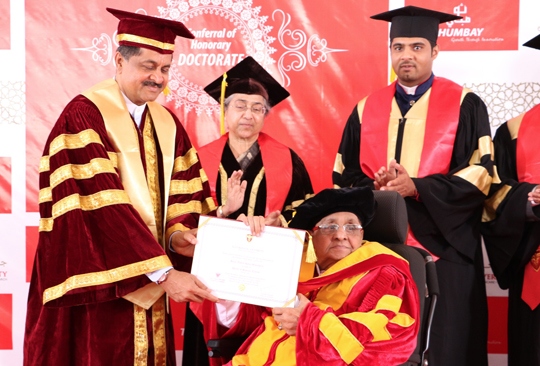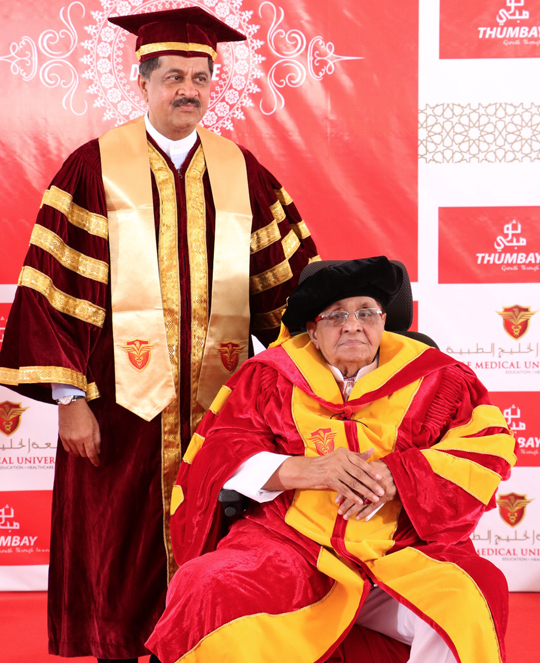Mangaluru, May 1: B Ahmed Hajee Mohiudeen, Chairman of BA Group – India, has been conferred with an honorary doctorate in view of his outstanding contributions to community development, by Gulf Medical University (GMU), the leading private medical university of the Middle East region located in Ajman, UAE.

The conferral was held at a special function at Thumbay Hills, Bantwal at 1:30pm on Sunday, May 1. Mr. Ahmed Hajee received the doctorate from Mr. ThumbayMoideen – Founder President of the Board of Governors of GMU, in the presence of Prof. Gita Ashok Raj – Provost of GMU and the Deans of GMU. The function was also graced by the esteemed presence of Mr. U. T. Khader - Minister for Health and Family Welfare in Karnataka and Mr. Ramanatha Rai - Minister for Forests, Ecology and Environment in Karnataka.
Mr. Ahmed Hajee was born in 1933 to Mr. B. Mohiudeen Hajee and Mrs. Mariamma in a business family in Mangalore. He graduated in Commerce in 1954 founded the B A Group in 1957, of which he is the Chairman. Today, B A Group is a well-diversified conglomerate.
Mr. Ahmed Hajee is a distinguished figure among the general public in Karnataka, particularly Dakshina Kannada, by virtue of his proven track record of excellence in industrial, educational, philanthropic, social and community services. The B A Industrial Training and Technical Centre is sponsored and managed by Mohiudeen Educational Trust, of which he is the Chairman. The Trust also runs a Kannada and English Medium School, a Pre-University College a Nursery School, a Medium Primary School and DarulUloom Mohiudeen Arabic College. There are more than 1500 students in these institutions.
Mr. Ahmed Hajee is a Board Member of Yenepoya Medical College and Yenepoya Dental College in Mangalore. He was also a member of Adult Education Society, Government of Karnataka and had served as a Syndicate member of Mangalore University. As an enthusiastic philanthropist, he has focused on the spread of education to weaker sections of the society and has contributed immensely to the community development and women empowerment in Mangalore and surrounding areas. He is the founder president of a number of institutions and trusts in and around Mangalore, and serves as the head of around 1000 masjids.
Mr. Ahmed Hajee has received several awards and felicitations for his achievements as a businessman as well as philanthropist. He had received the Lifetime Achievement Award' from the former President of India, Dr. A. P. J. Abdul Kalam.






Comments
Congratulations Sir. You Deserve it.
Congratulations Sir. May Almighty Allah give you strength and long life. ameen.
Maa Sha Allah Great Job Allahi Qhalleeq
Add new comment